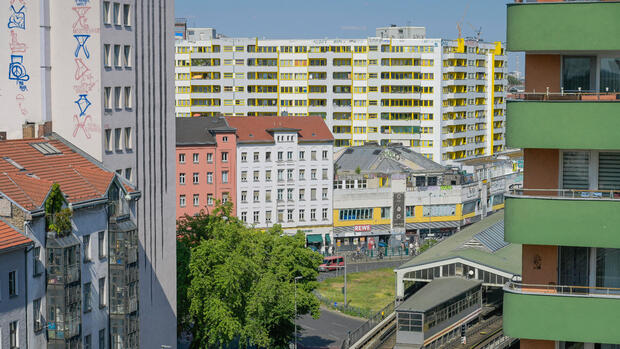According to Vonovia, there is a “substantial lack of affordable and energy-efficient living space”.
(Photo: IMAGO/Schöning)
Frankfurt, Berlin Germany’s largest real estate group, the Dax company Vonovia, reacted skeptically to the final report of the expert commission on possible expropriations and expects a judicial clarification. The report is now being intensively examined and evaluated by Vonovia, a company spokeswoman said on Wednesday.
However, nothing has changed in the basic attitude that Vonovia considers expropriation to be the wrong way to go. “Should the Senate now – as agreed in the coalition agreement – develop a framework law on socialization, this will be examined by the Federal Constitutional Court over the next two years,” said the spokeswoman. “The referral by the European Court of Justice is also conceivable.”
The expert commission submitted its final report to the Berlin Senate on Wednesday. According to the report, the Basic Law allows socialization, and the state of Berlin therefore also has the authority to pass a corresponding law.
In September 2021, a good 59 percent of voters in Berlin voted in favor of the expropriation of real estate companies with more than 3,000 apartments in Berlin. The red-green-red Senate then set up the commission, which began work in April 2022.
The Commission is chaired by former Federal Minister of Justice Herta Däubler-Gmelin (SPD). A black-red coalition now governs Berlin. Berlin’s Governing Mayor Kai Wegner (CDU) said on Wednesday that it was no secret that he was skeptical about possible expropriations. The new engine should not stall, he explained.
Housing industry: plans harm the location
Vonovia owns around 550,000 apartments, most of them in Germany. In Berlin, the real estate group, including the Vonovia subsidiary Deutsche Wohnen, has a total of around 144,000 apartments.
>> Read here: Welcome to Berlin socialism – a commentary
According to a study, at the end of 2019, out of around 1.66 million rental apartments in Berlin, 322,000 belonged to municipal real estate companies, and almost 190,000 apartments were owned by cooperatives. Around 1.15 million rental apartments belonged to private housing companies and individual owners. The combined market share of Vonovia and Deutscher Wohnen in rental apartments in Berlin is therefore less than ten percent. According to Vonovia, the average rent in Berlin is EUR 7.24 per square meter.
In Berlin there is a substantial lack of affordable and energy-efficient living space, said a spokeswoman for the company. However, the socialization or expropriation of housing companies ties up massive amounts of public capital and puts a strain on public budgets. “Private capital will be prevented for a long time from making a contribution to solving the urgent issues of the housing shortage and climate protection,” she warned.
>> Read also: How will the real estate market change?
The social divide in Berlin’s urban society is also being pushed forward, and climate protection is being done a disservice. “So socialization or expropriation does not help.”
The central association of the housing industry (GdW) warned of massive uncertainty among all investors. The projects of the expropriation initiative “damage all of Germany as a business location,” said GdW President Axel Gedaschko, who considers socialization to be disproportionate and unconstitutional. “In addition, the plans of the initiative would be one thing above all: expensive for all Berliners.” The financial possibilities for the construction of affordable apartments and the necessary energetic renovation of existing apartments would suddenly disappear into thin air. The country’s official cost estimate for 2019 resulted in compensation of between 29 and 36 billion euros.
Warning against false expectations
Instead of ideological utopias, which ultimately undermine society’s trust in our democratic pillars, the Berlin Senate should in future concentrate on the real challenge of our time, the GdW warned: the creation of affordable housing.
The Association of Berlin-Brandenburg Housing Companies (BBU) stated that Berlin, as a fast-growing city, needed a correspondingly growing range of housing. “But that only comes about through new construction, not through expropriation,” said BBU board member Maren Kern.
She, too, warned against false expectations: A socialization of large housing companies is neither compatible with the Basic Law nor the Berlin state constitution, nor would it be financially viable. “With the arbitrary limit of 3,000 apartments, it would violate the equal treatment requirement of the Basic Law as well as the constitutional requirement of proportionality, because apart from socialization in the form of new construction subsidies, for example, there would be milder means of achieving the goal of a relaxed housing market.”
More: What buyers and renters in Berlin have to reckon with
